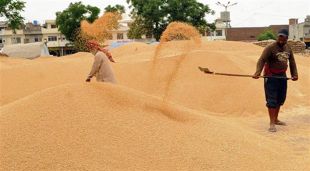Eating leafy greens, dark orange or red vegetables and berry fruits and drinking orange juice may lower risk of memory loss over time, especially in men, a study has found. The study, published in the journal Neurology, looked at 27,842 men with an average age of 51 who were all health professionals. Participants filled out questionnaires about how many servings of fruits, vegetables and other foods they had each day at the beginning of the study and then every four years for 20 years. A serving of fruit is considered one cup of fruit or half a cup of fruit juice. A serving of vegetables is considered one cup of raw vegetables or two cups of leafy greens. A total of 55 per cent of the participants had good thinking and memory skills, 38 per cent had moderate skills, and seven per cent had poor thinking and memory skills. The participants were divided into five groups based on their fruit and vegetable consumption. For vegetables, the highest group ate about six servings per day, compared to about two servings for the lowest group. For fruits, the top group ate about three servings per day, compared to half a serving for the bottom group. The men who consumed the most vegetables were 34 per cent less likely to develop poor thinking skills than the men who consumed the least amount of vegetables. The men who drank orange juice every day were 47 per cent less likely to develop poor thinking skills than the men who drank less than one serving per month. This association was mainly observed for regular consumption of orange juice among the oldest men, researchers said. The researchers also found that people who ate larger amounts of fruits and vegetables 20 years earlier were less likely to develop thinking and memory problems, whether or not they kept eating larger amounts of fruits and vegetables about six years before the memory test.
Intellectual disability is linked to air pollution
A team of researchers has linked intellectual disabilities among children to rising air pollution, stressing that exposure outdoor may impede cognitive development. According to the study funded by Public Health England and published in the Journal of Intellectual Disability Research, British children with intellectual disabilities are more likely than their peers to live in areas with high outdoor air pollution. The team analysed data from the UK's Millennium Cohort Study, a nationally representative sample of more than 18,000 UK children born in 2000 to 2002. People with intellectual disabilities in the UK have poorer health and die earlier than they should. Averaging across ages, children with intellectual disabilities were 33 per cent more likely to live in areas with high levels of diesel particulate matter and 30 per cent more likely to live in areas with high levels of nitrogen dioxide. "These children were 30 per cent more likely to live in areas with high levels of carbon monoxide and 17 per cent more likely to live in areas with high levels of sulphur dioxide," the findings showed. The authors noted that intellectual disability is more common among children living in more socio-economically deprived areas, which tend to have higher levels of air pollution. — Agencies



























